

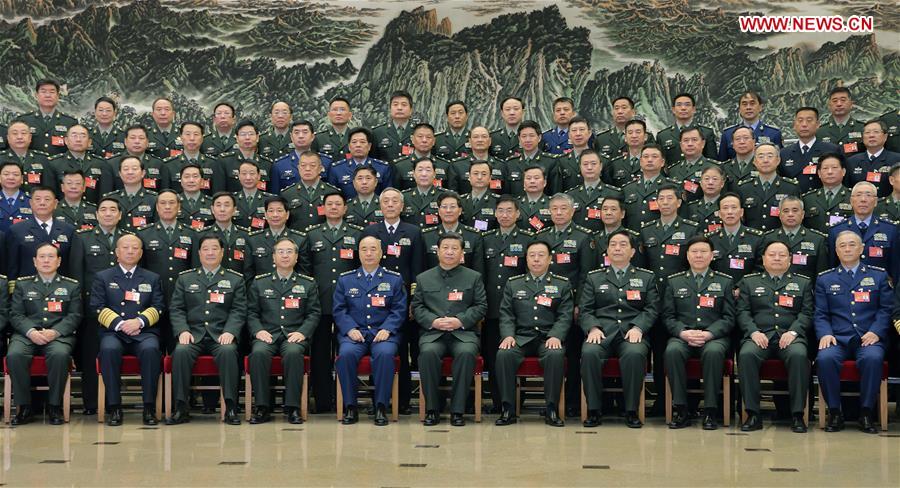
Chinese President Xi Jinping (C, front), who is also chairman of the Central Military Commission, poses for a group photo with delegates attending a meeting on reforming the armed forces in Beijing, capital of China. The meeting was held in Beijing from Nov. 24 to 26. (Xinhua/Li Gang)
REFORM KEY TO BUILDING A STRONGER ARMY
Xi said deepening defence and military reforms are a crucial step for the military's future, a sure path to a strong military, and a call of the time to realize the Chinese dream as well as a strong military dream.
He called on the military and related sectors to rally behind the strategy of strengthening the military through reforms.
The move to deepen defense and military reform is aimed at breaking down systematic, structural and policy barriers, modernizing the organization of the military, further unleashing the combat capacity and vigor of the military.
It should also aim at building a firm defense and strong military commensurate with China's international standing and interests in security and development.
Xi said, the history of the people's army is one of reform and innovation. "Under the leadership of the Party, the army has gone from small to large, from weak to strong, and from victory to victory," Xi said.
The reason why the military has stayed vigorous is that it has kept pace with times and never ceased reforming itself, Xi added.
"Now, as the country progresses from a large country to a large and powerful one, defense and military development stands at a new and historic starting line, Xi said.
Taking into consideration the world's larger picture as well as profound and complicated changes in the international landscape, "We must deepen defense and military reforms with greater wisdom and courage," Xi said.
Xi stressed the importance of regulating power within the military, demanding a strict system to regulate and supervise the use of power.
"Decision-making, enforcement and supervision powers should be separated and distributed in a manner that ensures they serve as checks and balances on each other but also run in parallel," Xi said.
Solving the problem of weak discipline enforcement and inspection, auditing and judicial supervision processes of the military are paramount, Xi said, pledging to eradicate the "soil" of corruption with stricter rules and systems.
A new discipline inspection commission will be established within the CMC and disciplinary inspectors will be sent to CMC departments and zone commands.
The CMC will have an audit office and a political and legal affairs commission. The independent and fair exertion of judicial power by military courts and procuratorates will be ensured with adjustments to the military judicial system.
The structure of troops will be optimized to improve the quality and efficiency of the army. A "revolution" of the management of the military will be rolled out with modern management techniques so that the army is managed professionally, Xi said.
STREAMLINING, PERIPHERAL REFORMS
China will also cut its troops by 300,000. Administrative and non-combat personnel in the military will be downsized. The proportion and structure of forces among different services will be streamlined to suit new security needs and operations.
Xi urged the military to "stand at strategic commanding heights" in future competitions and promote new ideas to drive the army's fighting capability, calling for more to be done in developing national defense science and technology, including frontier research in both major technology and new concepts.
Military personnel management should be streamlined in adherence with the CPC's leadership so that the military's human resources can help improve the army's capability in combat, Xi said. Reforms will improve in the management of all personnel, as well as medical care, insurance, housing and payments for servicemen.
The management style should fit the professional traits of military members and the sense of honor, pride and morale, Xi stressed.
Xi said it is important to promote the integrated development of both the military and non-military sectors, and of the economy and defense.
To this end, he required a management and operation system that integrates state leadership, coordination between the military and non-military sectors, as well as the market rules.
He called for strengthening the militia and reserve forces and national-level efforts to enhance management of and security to veterans.
Xi also noted the transfer or retirement of military personnel, saying special policies for arranging jobs should be given to them.
The military must resolutely terminate all paid services, Xi ordered.
Xi highlighted a timeline for achieving concrete results in the reform, saying breakthroughs in overhauling the leadership and joint command system must be made by 2020.
To finish the task, Xi said high-ranking military officers must take the lead to support the reform and defend the authority of the central leadership. Common soldiers should be guided to embrace the reform.
 |
Day|Week

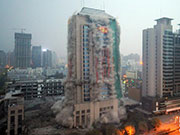 118-meter-high Never-used Building in NW. China Demolished
118-meter-high Never-used Building in NW. China Demolished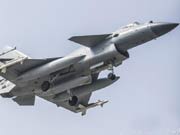 J-10B fighters with homegrown engine in test flight
J-10B fighters with homegrown engine in test flight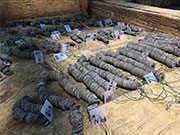 10 tons of copper coins unearthed in 2,000 years old ancient tomb
10 tons of copper coins unearthed in 2,000 years old ancient tomb Beautiful graduate from police college becomes Internet hit
Beautiful graduate from police college becomes Internet hit Photos of U.S. Navy intruding in South China Sea released
Photos of U.S. Navy intruding in South China Sea released What is inside China's icebreaker ‘Xuelong’?
What is inside China's icebreaker ‘Xuelong’? Chinese, U.S. navies hold first-ever joint exercise in the Atlantic
Chinese, U.S. navies hold first-ever joint exercise in the Atlantic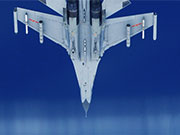 In pics: skies of glory
In pics: skies of glory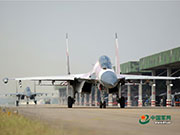 J-10, J-11, Sukhoi Su-30 fighters vs. HQ-9 anti-aircraft missile system
J-10, J-11, Sukhoi Su-30 fighters vs. HQ-9 anti-aircraft missile system Russian plane crash victims sucked out of seats as 'external impact' blew jet apart
Russian plane crash victims sucked out of seats as 'external impact' blew jet apart